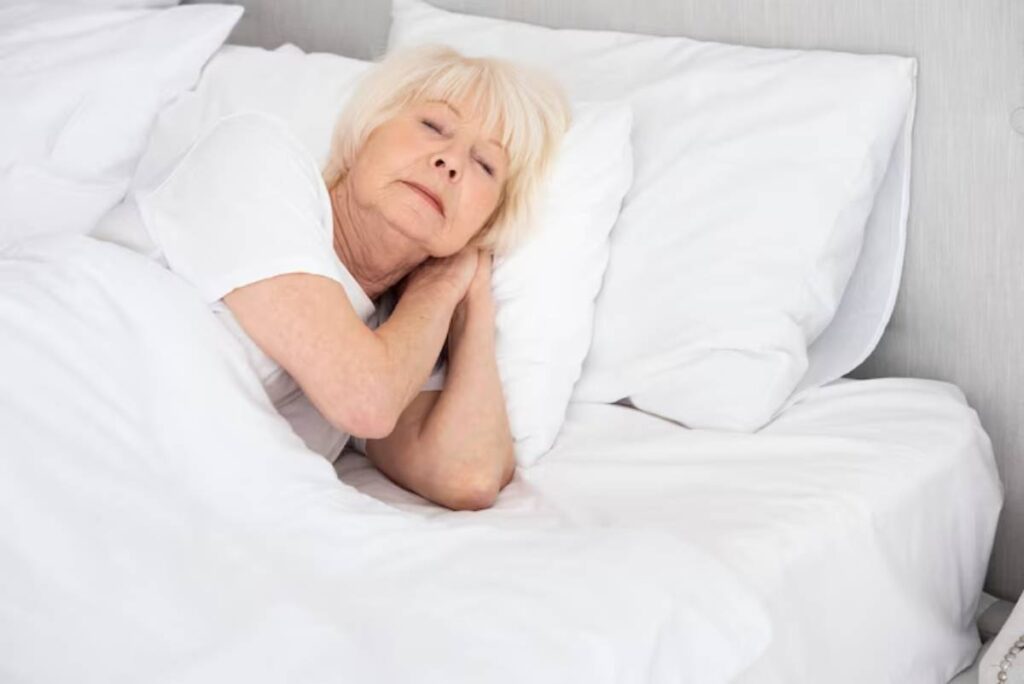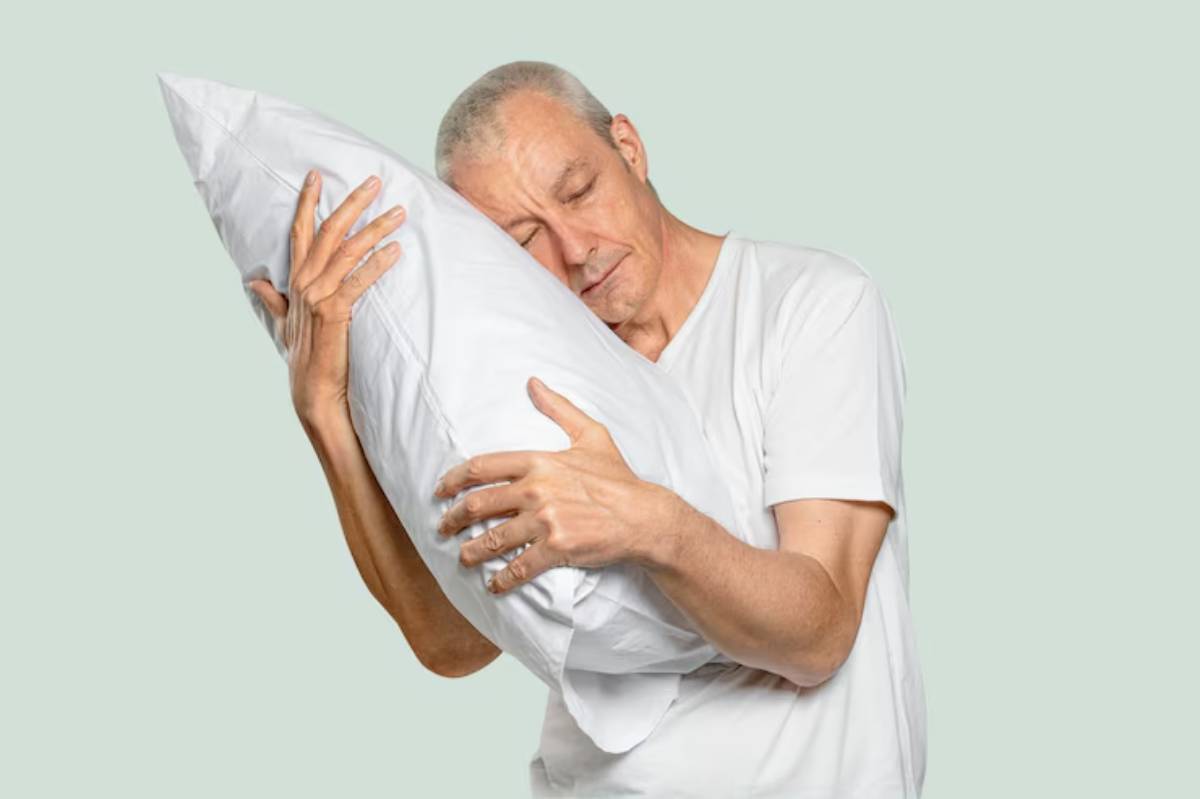The Health Blog

Enhancing Sleep Quality in Seniors Naturally
Sleep — once so easy, so automatic — often becomes a bit more elusive with age. Maybe bedtime drifts earlier than it used to. Or mornings arrive far too soon. There might be more frequent wake-ups, lighter sleep, or long stretches of staring at the ceiling in the quiet hours before dawn.
Sound familiar?
You’re not alone. Changes in sleep are a natural part of aging. But just because something is common doesn’t mean it’s inevitable. And it certainly doesn’t mean you’re stuck with it.
With the right blend of awareness, small shifts, and natural sleep aids for elderly individuals, better rest is not only possible — it’s within reach. Let’s explore the gentle path to deeper, more refreshing sleep as we age.
Understanding the Link Between Aging and Sleep
First, let’s clear up a common myth: seniors don’t need less sleep.
Adults over 65 still require about 7–8 hours of sleep per night. But how that sleep unfolds often changes.
Why?
A few reasons:
- The body produces less melatonin, the hormone that promotes sleepiness.
- Circadian rhythms shift, making people feel tired earlier and wake earlier.
- Sleep becomes lighter, meaning more sensitivity to noise or temperature.
- Health conditions or medications can disrupt sleep cycles.
- Bladder changes lead to more frequent nighttime trips to the bathroom.
It’s not just about getting older — it’s about how the body changes. And once you understand those shifts, you can work with them, not against them.
The Gentle Art of Senior Sleep Solutions

You don’t need high-tech gadgets or pharmaceutical fixes to sleep better. In fact, the most effective senior sleep solutions are often the simplest — small adjustments that bring the body back into its natural rhythm.
1. Embrace a Consistent Routine
One of the most powerful tools for better sleep at any age? Consistency.
Going to bed and waking up at the same time every day — even on weekends or after a rough night — helps regulate the body’s internal clock. That rhythm, once steady, naturally supports deeper, more restful sleep.
Try this:
- Set a gentle alarm for the same wake-up time daily
- Choose a wind-down routine (more on that shortly)
- Avoid long daytime naps (more than 30 minutes) late in the afternoon
Your body loves predictability. Give it that, and sleep starts to cooperate.
2. Create a Calm, Sleep-Ready Environment
As we age, sleep becomes lighter. That means small disruptions — a creaking floor, a draft, an early sunrise — can wake you up and keep you up.
Your bedroom should be a sanctuary for sleep.
Tips for making it more inviting:
- Keep the room cool and dark — blackout curtains or a sleep mask can help
- Use a white noise machine or soft fan to block background sounds
- Choose comfortable bedding that’s soft, breathable, and easy to manage
- Keep clutter and distractions (like phones or TVs) out of the space
Sometimes, all it takes is adjusting the space to signal to the brain: “It’s safe here. You can let go.”
3. Try Gentle Evening Movement
Exercise is wonderful for aging and sleep, but not all movement is created equal — especially close to bedtime.
What works well:
- A short walk after dinner
- Gentle yoga or stretching
- Light tai chi or chair exercises
Avoid anything intense or stimulating too close to bedtime. You want the body to wind down, not rev up.
Movement supports circulation, digestion, and overall calm — all essential ingredients for restful nights.
4. Limit Fluids in the Evening
Let’s talk about something no one enjoys: getting up to use the bathroom multiple times a night.
It’s common. But it’s also manageable.
One easy fix? Limit liquid intake after dinner.
Try to finish drinking larger amounts (water, tea, juice) a couple of hours before bed. If medication schedules require evening water, sip gently — not a full glass at once.
Also, avoid diuretics like caffeine or alcohol in the evening. They’re stealthy sleep thieves, even in small amounts.
5. Build a Gentle Wind-Down Routine
The mind doesn’t shut off just because you’ve turned off the lights. A wind-down routine helps ease the transition between wakefulness and rest — something especially helpful in the later years of life when sleep pressure is lower.
Consider this simple pre-bedtime ritual:
- Dim the lights around the house an hour before bed
- Listen to soft music or calming nature sounds
- Read a few pages of a comforting book
- Write in a journal or gratitude notebook
- Sip a cup of warm (caffeine-free) herbal tea
Let your wind-down be quiet, soft, and familiar. Over time, it becomes a cue to the body and brain: “Sleep is coming.”
6. Use Natural Sleep Aids — Wisely and Gently
While sleeping pills might seem like a quick fix, they often come with risks — especially for older adults. Falls, memory issues, and dependency are real concerns.
Instead, consider natural sleep aids for elderly individuals that are gentler on the body.
Options include:
- Melatonin (low dose) — helps restore rhythm, especially for early waking
- Magnesium — relaxes muscles and calms the nervous system
- Chamomile, valerian root, or lemon balm teas — time-tested herbal allies
- Lavender essential oil — diffused or applied lightly to a pillow
Always check with a healthcare provider before starting anything new — even natural options. Every body is unique, and safety matters.
7. Limit Evening Stimulation
Even quiet evenings can be overstimulating if they include the wrong things — like fast-paced news, heated conversations, or backlit screens.
Your brain needs time to shift from “thinking” to “sleeping.”
Helpful boundaries to try:
- Turn off the news and electronics at least 30–60 minutes before bed
- Avoid stressful topics or problem-solving discussions late in the day
- Choose soft lighting and quiet voices
- If reading, avoid thrillers or heavy material that might stir the brain
Even a simple shift — like switching from television to music — can ease the mind into a more restful state.
8. Address Emotional and Mental Health Gently

It’s not just physical discomfort that interrupts sleep. Worry, loneliness, or unresolved grief can all keep the mind active at night.
If you’re carrying emotional weight — whether fresh or long-held — know that it’s okay to ask for support. A counsellor, therapist, support group, or trusted friend can make a world of difference.
Sometimes the most powerful senior sleep solutions aren’t about bedtime at all. They’re about peace of mind.
When to Seek Extra Support

Natural approaches are powerful — but if sleep problems persist for weeks or begin affecting your mood, memory, or daily functioning, don’t hesitate to speak to your doctor.
You may be dealing with:
- Sleep apnea
- Chronic pain or restless leg syndrome
- Depression or anxiety
- Side effects of medication
There’s no shame in needing a bit more help. Often, a few small adjustments to medication timing or lifestyle can ease the issue without heavy-handed treatments.
Sleep Is Still Yours
Your body still remembers how to rest. It just might need a new invitation — a slower rhythm, a quieter room, a little patience, and a whole lot of kindness.
The path to better sleep isn’t about chasing perfection. It’s about creating the right conditions. Honouring what’s changed. Letting go of what no longer works. And gently reintroducing what soothes.
Explore more in: How Magnesium-Rich Foods Improve Sleep Quality









